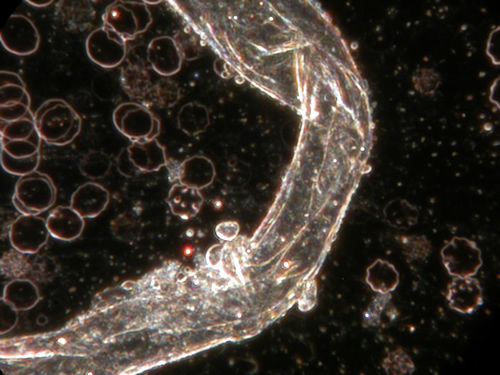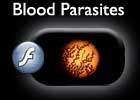Types of Parasites |
m | ||||||
Posted to Subscribers on 13 February 2009 |
|||||||
|
|
Dear Subscribers, Many of you sent emails with links after my last post on mold, but before I comment on that, I want to explain something that is probably new to some of you and repetition for a few. First of all, there are countless kinds of parasites and language in medical textbooks that is often confused and therefore obfuscating. For instance, it is not uncommon to refer to bacteria as parasites or occasionally even to refer to blood parasites as bacterial forms. Clearly, they are different so keeping this in mind is useful. Officially, there might be a few thousand parasites known to infect humans, but the catalogue is very likely incomplete, but the easiest way for you to understand them is to see them as miniature snakes. Just as snakes have habitats, food preferences and hunting patterns, and particular markings, so do parasites. For instance, in the world of snakes, there are boa constrictors and pythons and cobras and all sorts of other creatures like water moccasins and rattlers. Each one has behaviors that are unique to its species and the danger to others varies according to their food interests and interactions. Likewise, there are parasites that infect animals and humans that are unique to specific regions of the world and that pose varying degrees of danger to their host. However, I believe there are some misconceptions in certain minds about parasites that very much warrant discussion. First of all, you do not need to be living in the tropics in order to be at risk of parasite infection. Thanks to climate change, even the tropical parasites have vastly expanded their habitats so what we regard as improbable might, in fact, be possible. Moreover, travel greatly facilitates the spread of vector-borne parasitic infections. Some years ago, I heard a figure on a health program on TV, I think attributed to the London School of Tropical Medicine, that two-thirds of all people who ever lived on this Planet died of malaria. Perhaps they were viewing Africa as the home of all humanity and taking a very long view as to the origin of man, but the figure is nothing short of astonishing. People write me with lots of opinions, some of them rather mystical but the question is always whether or not the views are grounded and relevant. For instance, a common opinion expressed to me is that parasites only exist when there is something to clean up in the body. It's a tolerant notion, but I do not believe it is necessarily reliable. If we leave fruit on the counter, it will eventually get soggy and fruit flies will appear out of "nowhere" and you somehow realize that the flies are not due to leaving the screen door open. To some extent, parasites can also "appear" but that is because they were ingested or injected. Very casual contact can serve to spread these infections and this became evident to me when working in a clinic in Germany. The patients had traveled to all corners of the Earth and a few of them harbored very exotic looking parasites. Since I was checking some of the patients daily, I was well aware of the starting points, but sometimes a new parasite would show up that had a remarkable resemblance to one I had seen earlier in another person. The idea that parasites exist because our milieu allows this is not probably 100% correct if by believing this we are assuming that there was no precise point of entry. It might be true that the pH balance, diet, herbs, supplements, and levels of toxicity do affect the ability of parasites to survive, but to blame infections on imbalance might, at least in some cases, be like putting the cart before the horse. Textbooks say that unless the infection if serious, as in life-threatening, the treatment is worse than the cure. This is true if the treatment involves arsenic and other toxic substances, but the most common parasitic treatment worldwide is Artemisia annua and it is very well tolerated by nearly everyone.
What I saw in Europe when I was using the darkfield microscope for hours and hours and hours every day was that mercury amalgams and other toxins do, in fact, inhibit the ability to survive but the level of toxicity required is, not surprisingly, very high, more or less what the textbooks suggested. In other words, to be parasite free, one would probably be close to crippled by metal toxicity suggesting, of course, that parasites are very well adapted to living in their hosts. They are also highly mobile so when there is food in the stomach, they may go there and cause temporary bloating, not to mention ripping you off of your meal, but then they may go to the reproductive organs or brain or practically any other part of the body. The symptoms reported by patients are often demeaned by doctors because things that are inconsistent or that change suggest hypochondria or even delusional parasitosis, but parasites do move about and they lay their eggs in places that seem quite safe to them, you know like turtles in the sand or birds that go to uninhabited islands to nest. Unfortunately, they lay thousands and thousands and thousands of eggs so getting rid of infections can take quite a lot of perseverance. How They Die Now, coming to what I wanted to say in this missive . . . when parasites die, there is a dead critter in the body somewhere. If it is zapped, it tends to lose its moisture. What I have seen here is that the parasites look shriveled up and dry and rather inert but they still constitute foreign debris in the plasma (or wherever else they are found but I was only checking blood, not other tissues). With more sophisticated frequency machines, the parasites are electroperforated and depending on exactly how this was achieved, they may be practically sterile or they may still decompose in some manner. When herbs or diet cause the death, the parasites will generally be devoured by bacteria, meaning there will be mild flu-like symptoms for a few days, usually the worst is the third day after they die but days 3 through 5 are generally achy. In most cases, the patient does not feel bad enough to want to stay in bed but their instinct is to blame the herbs for making them feel yucky when in reality, it is the death of the invader and its hygienic removal that are the cause. Seeing this again and again and again in patients gave me a new interest and respect for bacteria. What was even more fascinating was that the white blood cells do not go near the carcasses until the bacteria have eaten as much as they could. They really devour the fleshy parts of the parasites so the places in the sample where you see the dead parasites are literally teeming with bacteria, but the bacteria are very focused and they are doing exactly what you need for them to be doing. Thus began my little love affair with bacteria and my war with Pasteur and Co. Every day, the white blood cells moved a bit closer and then closer and closer to the site of the death and by day 5 or 6, they ate the bacteria and sprayed a mist on the remaining too tough to chew parts of the critter and then cleaned up that mess too. So, I fell in love with white blood cells also. Moreover, I found their behavior intelligent and fascinating. It's very clear they know their environment and that they communicate and coordinate. Now, what happens if there are no bacteria? This is not a pleasant sight. If there are no bacteria, which can happen if people are taking antibiotics or even too much colloidal silver, not to mention if they are trying to be so germ-free that they are ingesting excessive amounts of probiotics, essential oils, or heaven forbid chlorine or fluoride. Yes, these germ-free propagandists are missing a big piece of the puzzle and foisting danger on unsuspecting victims. When there are no bacteria, parasites decompose through fermentation, endless bubbles and gases and noxious decomposition occurs. Mostly, this looks yeasty but I have occasionally seen hyphae jabbed right into the body of a parasitic corpse and it is sucking up the increasingly soggy looking flesh of the dead parasite. It's an ugly process and, in my opinion, ever so much more dangerous than a bacterial infection. Moreover, because the fungal forms are viable and dangerous, they do not vanish the way the bacteria do. The white blood cells will not take on an adversary as formidable as fungi.
So, the heresy is either Pasteur's or mine. He misled so many people that 20th century medicine went south on us or those who dare to question him are the lunatics? Big Pharma is making a bundle on antibiotics and other dangerous drugs and it pitches them to both the scientific and lay community by trying to scare us with horror stories about bacteria. This is easy enough to do, but what if the real problem is parasites, not bacteria? That's a really interesting question because it would mean that the thrust of focus should be shifted. In our less than enlightened current state in the U.S., there is a witch hunt underway for darkfield microscopes. Basically, unless one is willing to take great risks, it is necessary to take the scope to another country, one that is not dominated by profiteers who operate at the expense of humanity. Why would anyone want to deny someone the right to look through a microscope? Why? I want to continue this discussion because I do not think that the emails I am receiving indicate that people have actually assimilated the basic information I am trying to impart on parasites, fungi, and immunity . . . and, of course, toxicity. These are areas of intense focus in my work because they are the determinants of degeneration or recovery from insult. Because I had the opportunity to work in Europe, I have been able to develop perfect protocols for these really ordinary conditions and now I want to put my time and attention into teaching and research and turn over other things to the new herbal cooperative which is making headway. However, because so many of you wrote me, I felt to write a series explaining what I have seen and why it makes so much sense. The parasite video is found here: http://subscriptions.bioethika.com/video/blood_parasites.html The herbs are found here: Blessings, Ingrid
|
||||||
Home || Contact Us |
|||||||
No content on any of the pages of this web site may be reproduced without written permission of Ingrid Naiman and Seventh Ray Press, publisher of this site. |
|||||||
|
|||||||
 Before going into this, I simply want to add two more cogent points. There was a case of chikungunya in France attributed to a tourist. It precipitated an epidemic that reached into Germany and North Italy, all allegedly stemming from a single individual. Any epidemiologist would corroborate the likelihood of something like this when tracking typhoid cases or even AIDS or SARS but very few realize that parasitic infections also travel because the vectors, mosquitoes and ticks and other insects, feast on many hosts. I think it is too late to turn the calendars back. People have been traveling for centuries and the climate issues are not going away tomorrow.
Before going into this, I simply want to add two more cogent points. There was a case of chikungunya in France attributed to a tourist. It precipitated an epidemic that reached into Germany and North Italy, all allegedly stemming from a single individual. Any epidemiologist would corroborate the likelihood of something like this when tracking typhoid cases or even AIDS or SARS but very few realize that parasitic infections also travel because the vectors, mosquitoes and ticks and other insects, feast on many hosts. I think it is too late to turn the calendars back. People have been traveling for centuries and the climate issues are not going away tomorrow.

